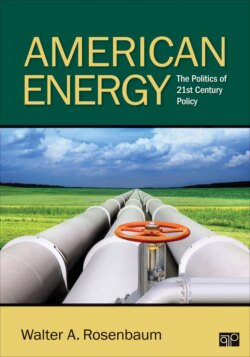Читать книгу American Energy - Walter A. Rosenbaum - Страница 14
На сайте Литреса книга снята с продажи.
”Only the First Step”
ОглавлениеSome significant policy change was evident in the immediate wake of the Deepwater accident. A month before the accident, Obama had modified his original opposition to new oil exploration in the Gulf and had approved new drilling. The accident immediately compelled a White House reversal and a new drilling moratorium. Blaming the disaster on BP and on the federal Minerals Management Service (MMS) responsible for regulating offshore petroleum exploration, the administration initiated a sweeping investigation of BP’s incompetent disaster management and the MMS’s deficient regulatory oversight. And there was plenty of mismanagement and negligence to find.
The immediate results from this initial burst of investigations were new, numerous, federal indictments of BP for corporate violation of federal regulatory laws, the abolition of the discredited MMS and its replacement by a new federal regulatory agency with increased regulatory authority, and a wave of congressional hearings to accompany presidential investigations of the disaster and its aftermath. The Department of the Interior (DOI) initiated measures to improve coordination between federal and state governments in Gulf disaster management.
But these policy innovations, and others soon initiated, evolved slowly and contentiously while the public impact of the disaster—a critical consideration in producing an accelerated and comprehensive redesign of drilling policy—seemed to dissipate within weeks. Four months after the disaster, for instance, while the Gulf oil slick was still invading Gulf beaches, national polls reported that more than 50 percent of the public still approved of offshore oil exploration, and the disaster itself ceased to command major media attention.13 Moreover, Louisiana and other Gulf states with economies enriched by royalties and employment flowing from Gulf energy exploration wanted no long-term interruption in these benefits—Deepwater explosion notwithstanding—and successfully applied pressure on the Obama administration, which reluctantly relaxed the new moratorium after only a few months.
Within months of the disaster, the federal courts—a certain venue in any important conflict about national energy regulation—were drawn into the conflict and will remain for years to come. The federal government sued BP to recover damages for criminal negligence and for violation of the federal Clean Water Act. Others with claims of injury against BP, including state and local governments, environmental groups, private parties, and other corporations, have initiated litigation.
More than three years after the disaster, both the presidential committee originally investigating the Deepwater explosion and a subsequent inquiry by the National Research Council concluded that the Obama administrative reforms were impeded by serious delays and but “a first step” toward a needed comprehensive reform and much more was required.14 The Gulf disaster had receded so far from public consciousness as to virtually disappear, along with the momentary flicker of public interest in energy itself as a major public issue. Meanwhile, despite almost continuous congressional hearings since the event, by 2014 only two significant bills had been passed in response to the Obama administration’s call for a much more comprehensive redesign of federal energy regulation. In short, after a brief burst of modest innovation and reform, policy was moving along incrementally.
